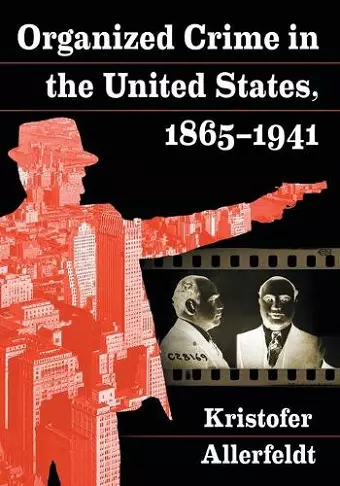Organized Crime in the United States, 1865-1941
Format:Paperback
Publisher:McFarland & Co Inc
Published:6th Feb '18
Currently unavailable, and unfortunately no date known when it will be back

Why do Americans alternately celebrate and condemn gangsters, outlaws and corrupt politicians? Why do they immortalize Al Capone while forgetting his more successful contemporaries George Remus or Roy Olmstead? Why are some public figures repudiated for their connections to the mob while others gain celebrity status?
Drawing on historical accounts, the author analyzes the public's understanding of organized crime and questions some of our most deeply held assumptions about crime and its role in society.
“Allerfeldt presents a revisionist history of organized crime in the US from the mid-19th to the mid-20th century.... includes some well-known characters (e.g., David Hennessy, Al Capone, J. Edgar Hoover), but lesser-known figures who played important roles in shaping perceptions are also featured...recommended ”—Choice; “Through detailed research, Kristofer Allerfeldt’s Organized Crime, 1865-1941 penetrates the myths surrounding organized crime by uncovering the true motivations of the actors involved in its most seminal events. As a result we get fascinating insights into the real story behind such matters as the murder in 1890 of David Hennessey, the New Orleans police chief, the real relationship between Al Capone and Chicago mayor Big Bill Thompson, and the successful prosecution of the KKK by Hiram Whitley, now, unfortunately, little known to history. This, however, only scratches the surface. Allerfeldt’s work is as comprehensive as it is insightful, a worthy offering in the latest scholarship on this unique and all-too-American type of criminality.”—Barry Latzer, Professor Emeritus, John Jay College of Criminal Justice, CUNY; “Kris Allerfeldt’s new book brilliantly captures the corrupt, messy and duplicitous nature of both organized crime and demands to combat organized crime during the decades between the Civil War and the Second World War. The ‘usual suspects’, Al Capone, Arnold Rothstein and Lucky Luciano in Organized Crime, 1865-1941 only feature as passing players rather than founding fathers of fantastic criminal dynasties. The cast of characters in Allerfeldt’s account consists of white supremacist terrorists, counterfeiters, smugglers, pimps as well as American-born gangsters, racketeers and kidnappers. Added to these were the self-serving hypocrites in government or respectable society that molded public opinion on the thing that became known as ‘organized crime’. The evidence presented here tends to support Capone’s 1931 assessment, ‘Nobody’s on the legit, you know that and so do they. Nobody’s really-on the legit when it comes down to cases.’”—Michael Woodiwiss, author of Double Crossed: The Failure of Organized Crime Control.
ISBN: 9781476670652
Dimensions: 254mm x 178mm x 15mm
Weight: 499g
300 pages